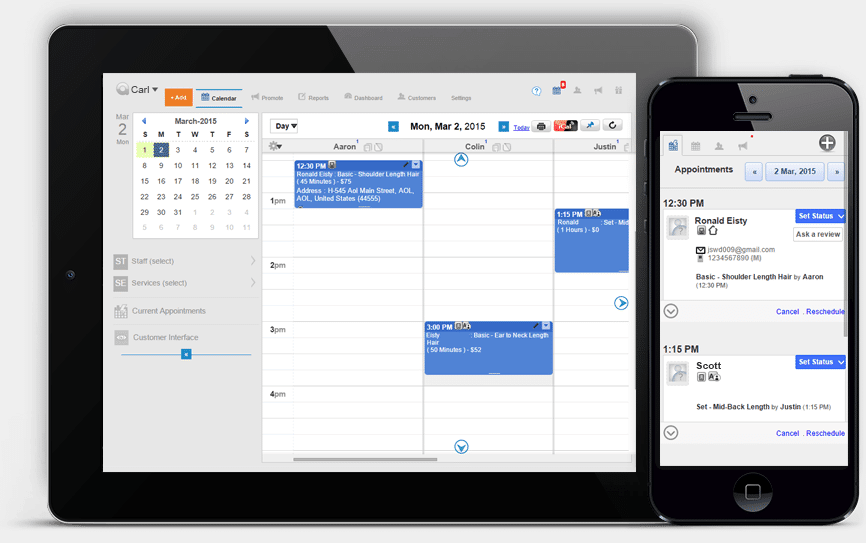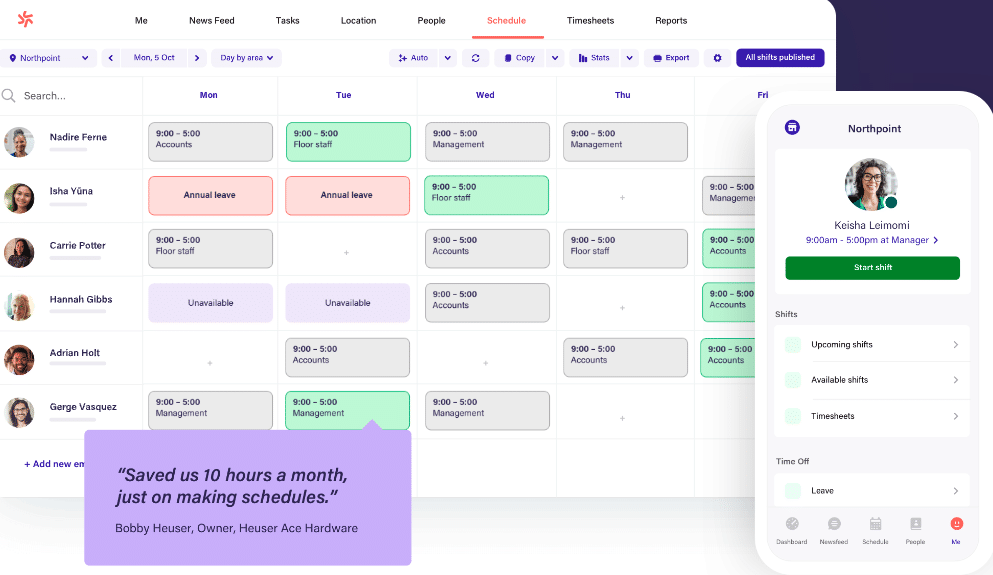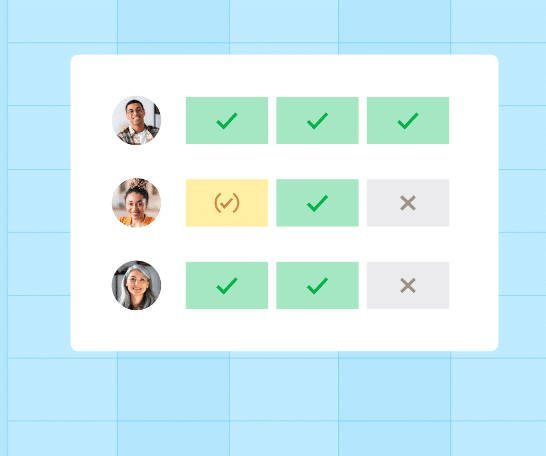The Best Scheduling Apps For Small Business
As a small business owner, you constantly balancse efficiency with a personal touch.
But manual scheduling, last-minute meetings, and chasing clients prevent you from focusing on what matters the most. While the relationship between stress and entrepreneurship is well-documented, we won’t dive into that.
In this article, we’ll share a list of the seven best scheduling apps for small businesses, how to choose your scheduling app, and a practical way of upgrading your appointment scheduling app efficiency.

Timeular’s easy and smart experience, paired with its powerful reporting and leave-tracking functionalities, makes time tracking a delight.
If you’re looking for a solution to automate your schedule and support employees to have more focus and interrupted time, you’re in the right place.
Today we will talk about the best scheduling apps tailored for small businesses. You will learn about the pros, cons, and prices of the software we’ve selected for you.
By the end of the article, you’ll be able to choose the scheduling solution that best fits your needs. Stay with us until the future; we’ll reveal some precious tips about how to make our schedule even more efficient.
What are scheduling apps?
Scheduling apps are software programs that facilitate appointment booking processes and task management.
For some businesses, that means automatically scheduling meetings with leads. For others, it means managing employee shifts and client appointments.

Get your free copy and discover how to leverage the power of time tracking in your team.
Scheduling apps help small business owners stay on top of all the moving parts of their operations. This is crucial for time management and maintaining an excellent work-life balance.
What are the best scheduling apps for small businesses?
Below, you’ll find our top choices for scheduling apps. If you, by any chance, decide to create schedules manually, use the free work schedule templates created by our team.
1. Calendly

- Budget: $0 – $16 per month
- Integrations: With the most popular calendars
- Customer care G2 ratings: 9/10
Calendly is one of the most popular scheduling apps on the market, and it’s easy to see why. The app saves time and eliminates the back-and-forth of scheduling appointments. It integrates with Google Calendar, Outlook, and other major calendar platforms, making it easy to keep track of your schedule.

One of the best things about Calendly is its flexibility. You can use it to schedule appointments with clients, customers, or colleagues, along with team meetings, webinars, or events. Plus, if you have a busy schedule, Calendly has a great feature that allows you to block out time for specific tasks through whatever calendar app you use.
Calendly offers a free-forever plan that will give you access to some of the core features you need. However, if you’re looking to take advantage of Calendly’s scheduling features, you’ll probably want to upgrade to a professional account for $12 per user per month.
Learn how to integrate Timeular with Calendly.
2. OnceHub (former ScheduleOnce)

- Budget: $0 – $950 per month
- Integrations: Supports multiple integrations: Video conferencing, calendars, and CRMs
- Customer care ratings: 9.1/10

Get your free copy and discover how to leverage the power of time tracking in your team.
OnceHub is a top-rated scheduling app designed to streamline the lead nurturing process.
Like Calendly, ScheduleOnce integrates with major calendar platforms to match prospects with the right person for every meeting.
Within the app, small business owners have access to a suit of powerful features that will help them make the most of the time they have, including:
- Panel Meetings: Leads can schedule meetings with a panel of team members. The panels can be set in advance or based on the team members available at the time.
- Priority Assignment: Leads are automatically routed to team members based on their experience level.
- Meeting Templates: Leads can choose from various meeting types when picking their time slot. These templates help your team prepare and give the meeting a sense of structure.
ScheduleOnce offers a high-value free-forever plan that grants access to many key features a small business needs.
Read also: How to make an effective schedule for employees
3. Appointy

- Budget: $0 – $79.99 per month
- Integrations: Integrates with video conferencing apps and most calendars.
- Customer care ratings: 9.4/10
If you’re looking for an app that’s specifically designed for small businesses, Appointy is a great option.
The app offers a variety of features to help you manage your appointments, including:
- Customizable Appointment Forms: You can create custom forms for new and returning customers to fill out before their appointment. This helps you gather the information you need ahead of time.
- Automatic Reminders: Appointy will automatically send confirmations and reminders to your customers, so you don’t have to worry about forgetting anything.
- Client Management: Keep track of your appointments and history with Appointy’s client management features.
- Reporting Tools: Get insights into your business’s appointment trends with Appointy’s reporting tools.
One of the best things about Appointy is that your customers (or team) can schedule meetings from wherever they are.
If you have a website, the Appointy widget can be easily integrated. If you don’t, you can use Facebook as a booking platform or the unique subdomain provided with every Appointy account.
In terms of downsides, it must be said that Appointy’s UI leaves a bit to desire, in our opinion. If you only care about features, Appointy might be perfect!
Read also: The greatest scheduling and appointment apps
4. Acuity Scheduling

- Budget: $14 – $45 per month
- Integrations: Supports multiple integrations.
- Customer care ratings: 9.3/10
Acuity Scheduling is perhaps the simplest scheduling app on this list in terms of features. Team members and clients can choose appointments based on their availability.

These appointments are shown in your Acuity calendar (and whatever external calendars you connect). Nothing flashy.
That said, Acuity Scheduling is still one of our favorites because of how simple, clean, and effective.
Everything is minimal, so your clients (and employees) should have no trouble booking a time slot.
Learn how to integrate Timeular with Acuity.
5. Deputy

- Budget: $3.50-$4.90
- Integrations: Integrates with payroll, point of sale, and HR systems
- Customer care ratings: 9.0/10
With Deputy, small business owners can manage shifts and payroll. To use the software, you need to be tech-savvy, as the setup and the onboarding may not be that intuitive.
Deputy supports many integrations with the most popular management software, such as Gusto, QuickBooks, BambooHR, and Revel.
Beyond scheduling, Deputy supports other features such as demand forecasting, taking pictures, and break compliance.
Connect Deputy with Timeular
Learn how to integrate Timeular with Deputy.
7. Doodle

- Budget: $0-$8.95
- Integrations: Supports multiple integrations
- Customer care ratings: 8.7/10
Doodle is a powerful software for scheduling meetings with clients, colleagues, and teams. This is especially good for managing multiple schedules in conflict.
Key features of Doodle are:
- Booking Page: Take bookings directly into your calendar by just sending a link. The feature will also help you prevent no-shows as it will send automatic reminders to future attendee group pools. It will also prevent juggling between people’s schedules. It helps you find the right moment to plan a meeting and ensure everyone is free to join.
Doodle is now fully equipped for full remote work with integrations with Zoom, Google Meet, or Webex. It offers robust security and works best for people in need to manage multiple groups of people.
Read more about the best Time Management Techniques.
Why do small businesses need scheduling apps?
There are crucial reasons why small businesses need scheduling apps.
- Save time: A good scheduling app automates much of the manual work of managing a schedule. This improves business efficiency because it frees business owners and employees time to focus on more critical tasks.
- Stay organized: Tracking everything in a central location helps avoid double-booking, overscheduling, and other common mistakes.
- Keep employees updated: Everyone will be on the same page, knowing what’s happening inside the company.
- Improve communication: With many stakeholders in a small business, it’s essential to have clear and consistent communication. Scheduling apps can help with that by providing a single platform for everyone.
- To back up quickly from errors: With everything in one place, it’s easier to catch errors and make corrections on the schedule. This helps businesses avoid permanent mistakes that can impact their bottom line.
Recommended read: Business productivity reinvented: Unconventional ways to stay ahead of your competition.

How to choose the best app for your business?
There are a lot of great scheduling apps on the market, but not all are suited for small businesses.
Some factors you may want to keep in mind when choosing a scheduling app include:
- The size of your business: If you have a large team, you’ll need an app that can accommodate everyone. On the other hand, if you’re a solopreneur, you may not need all the bells and whistles that come with more robust apps.
- The type of business you have: If you have a service-based business, you’ll need an app that allows online booking. On the other hand, you may not need that feature if you run a retail store.
- Your budget: Scheduling apps can range in price from free to several hundred dollars per month. Be sure to choose an app that fits within your budget.
- The integrations you need: Which tools are you currently using? You want to choose a scheduling software that integrates easily with your current tech stack.
- Customer support: We don’t want to be stuck at 11 pm at night waiting for a customer support answer, right? Make sure to choose an app with excellent customer support reviews.
The bottom line is that there’s no one-size-fits-all solution for scheduling apps. But by considering your needs, you can narrow down your options and choose the best app for your small business.
Learn how to build a Time Management Plan.
The secret to upgrading your scheduling efficiency

Read also: How to be more efficient. Achieve more in less time
If you want to capture accurate timesheets and facilitate complex schedule management, consider doing time tracking.
Time tracking is a time management technique that measures how much time you and your people use to accomplish a task. Far from being micromanaging, time tracking is a compelling strategy to perfect your planning abilities.
Those are some benefits of time tracking:
Employers benefit from:
- Streamlined payroll: When employees are using a time tracking tool, they can seamlessly transfer data from the app to their payroll solution and minimize steps and human error.
- More accurate project estimates: When employers know how long it takes for their employees to complete tasks, they can accurately predict how long a project will take and reduce scope creep.
- Better team management: You can ensure that your team is working on tasks that align with their skill set and aren’t overworking themselves.
Read also: How to calculate payroll hours
Employees benefit from:
- Task delegation: Some employees aren’t always doing the work that they’re good at, and they keep it to themselves because they don’t want to seem like they’re complaining. But when you’re tracking your time, your manager can see what tasks you excel at and which ones would be completed more efficiently by another team member.
- Balanced workloads: Employees also don’t like to tell their managers they’re over or underworked. But you don’t have to with time tracking because it’ll tell them for you.
Increased productivity: With all these different eliminates potentially working in your favor, you’ll be able to increase your productivity.
Conclusion
The progress of appointment scheduling apps like Calendly, OnceHub, Appointy, Acuity Scheduling or Deputy have revolutionized time management for small businesses.
These tools streamline the appointment process and integrate seamlessly with popular platforms like Google Calendar, enhancing overall efficiency.
The right online booking solution, tailored to a business’s needs, can significantly elevate operational effectiveness, allowing business owners to focus on growth and customer service.
Most scheduling apps, including Acuity Scheduling and Square Appointments, offer seamless integration with Google Calendar. This means that any appointment booked via the online booking page is automatically updated in Google Calendar, ensuring real-time schedule synchronization.
Yes, many scheduling apps allow for the customization of the booking page. This feature, available in apps like Acuity Scheduling, enables businesses to align the booking experience with their brand, offering a personalized touch to their online booking process.
Absolutely. Tools like Deputy are specifically designed to handle both employee shift management and appointments efficiently. This dual functionality makes them versatile options for small businesses looking to streamline various scheduling needs.